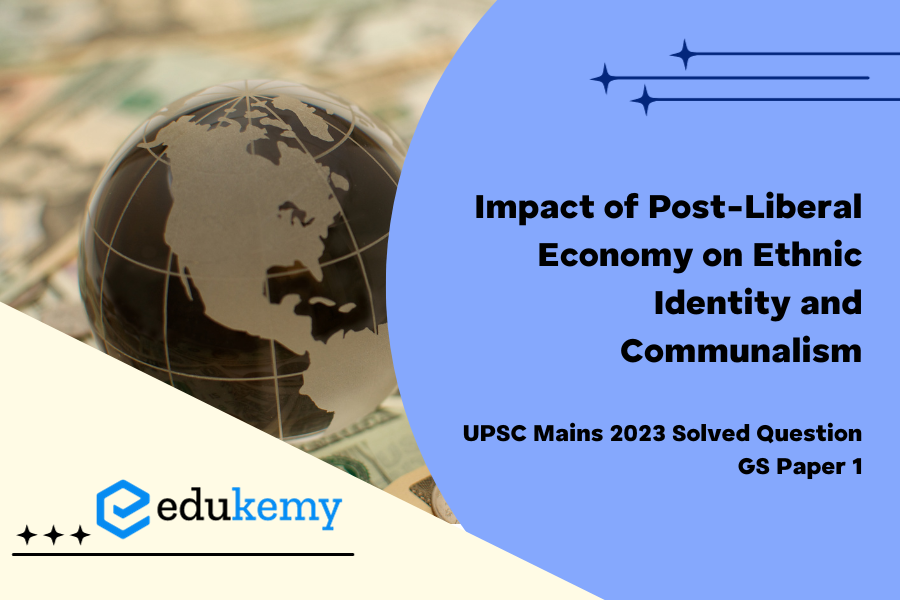UPSC Mains General Studies Paper – 1 Mains 2023
UPSC Mains Civil Services IAS Exam Question Paper – 2023
Contents
Introduction
In the Indian context, communalism is defined as aggressive chauvinism based on religious identity. However, post liberalisation, the changes in the economic sphere have led to socio- political changes reshaping the dynamics of ethnic identities and Communalism.
Body
Impact on communal identity-
1. Economic inequalities manifesting as communalism:
- The Sachar Committee concluded that the conditions (economic vulnerability) faced by Indian Muslims was below that of Scheduled Castes and Scheduled Tribes.
- Such disparities breed discontent thus impacting the principle of harmonious coexistence.
2. Communalisation of politics:
- In absence of consummate increase of employment opportunities, a bulk of youth seeks identity through religion based political radicalisation manifesting in riots like that of Muzaffarnagar 2013.
3. Fake news and virtual ghettoism
- The easy dissemination of information through ensured connectivity- internet, media, elsewise, has facilitated spread of fake news, rumours, propaganda videos.
- This has increased the communal tensions- caste violence, religious riots (Nuh violence, 2023), exodus of people of certain areas from some cities.
| Case study- Nuh, Haryana Post the violence between Hindus and resident Muslims of the region, the aftereffects stretched to adjoining regions like Gurugram where the Muslim migrant workers were systematically asked to go back to their ‘native place’. |
4. Mob lynching and herd mentality”:
- With neo-media taking ground, social media groups acting as eco chambers, the speed of circulation of propaganda has increased manifolds.
- The obvious outcome is visible in form of individualized and immediate punishments- mob lynching (Aklaq khan case), crowd violence on name of cow vigilantism etc.

Impact on ethnic identity-
1. Dalit mainstreaming:
- Through establishment of institutions like DICCI, the dalit identity has been brought to the mainstream.
- This has helped in social empowerment of the ‘backward classes.’
2. Transnational ethnic identities:
- The widespread Indian diaspora in the world- Sikhs in Canada, Keralites in UAE have got recognition at a wider scale.
- Being manifestation of India’s soft power, these ethnic identities have hardened in the literal sense.
3. primitive identity hardlining and regionalism:
- Globalisation due to its very nature has accrued commonality in diverse regions. The consequent ‘loss of unique identity’ is negated by hardlining across the primitive identities and post hardlining antagonism evident in ethnic identity, regional identity.
- This translates to ethnic violence and communal conflict from local to regional and even national scale.
| Case study– Manipur violence Ethnic violence between the Kuki-Zomi tribals and the State residents Meitei’s over historic demand for the latter’s recognition as ST. Violence has continued since May 2023. |
- Globalisation and urbanisation has allowed for cultural assimilation for various communities, showcasing their unique and exotic marketable products. Besides it has also facilitated in de-emphasising the role of ethnic identity by facilitating migration.
Conclusion:
Hence, The post liberal economy is replete with possibilities to create institutions and systems to effectively check the spread of communal tension in society, state’s regulation of neo media (fake news has been listed as crime in Bharatiya Nyaya Samhita Bill) and use of education system to spread awareness about the core issue at hand remains the way forward.
In case you still have your doubts, contact us on 8792740517.
For UPSC Prelims Resources, Click here
For Daily Updates and Study Material:
Join our Telegram Channel – Edukemy for IAS
- 1. Learn through Videos – here
- 2. Be Exam Ready by Practicing Daily MCQs – here
- 3. Daily Newsletter – Get all your Current Affairs Covered – here
- 4. Mains Answer Writing Practice – here
Visit our YouTube Channel – here


